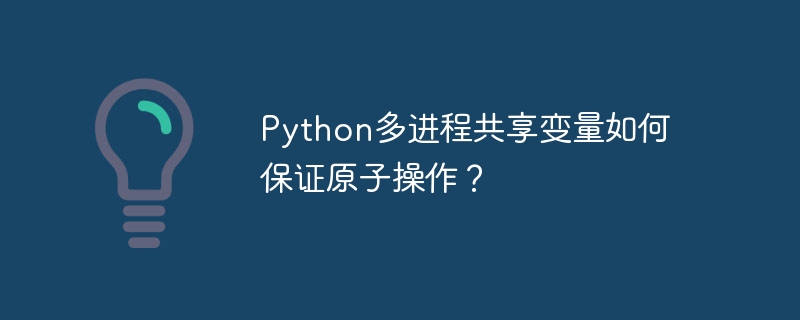Python多进程共享变量如何保证原子操作?
时间:2024-12-16 21:18:57 178浏览 收藏
本篇文章给大家分享《Python多进程共享变量如何保证原子操作?》,覆盖了文章的常见基础知识,其实一个语言的全部知识点一篇文章是不可能说完的,但希望通过这些问题,让读者对自己的掌握程度有一定的认识(B 数),从而弥补自己的不足,更好的掌握它。

如何保证 python 多进程共享可操作变量的原子操作
在多进程环境中,共享变量的原子操作至关重要,以防止竞争条件。在 python 中,可以使用 manager 类来创建共享值,但单纯使用 manager 无法保证原子性。
在你的示例中,你遇到了多进程读取同一整型变量时产生错误值的问题。这是因为进程竞争访问共享内存,导致不一致的状态。
解决方案
使用 lock 来保证原子操作。lock 可以确保在任何时候只有一个进程访问共享资源。在你的代码中,你可以像下面这样使用 lock:
def calc_number(x: int, y: int, _m, total_tasks: int, _lock):
# 使用锁来保证原子操作
with _lock:
_m.value += 1
current_value = _m.value
# ... 代码继续通过使用锁,你可以确保一次只有一个进程更新共享的整型变量 _m.value。
此外,确保在进程池外创建一个单一的 manager 和 lock 对象也很重要。多次创建这些对象会导致不同的进程使用不同的锁,这会破坏原子性。
修改后的代码如下:
from concurrent.futures import ProcessPoolExecutor
import ctypes
from multiprocessing import Manager, Lock
import os
# 创建 Manager 和 Lock
manager = Manager()
m = manager.Value(ctypes.c_int, 0)
lock = manager.Lock()
def calc_number(x: int, y: int, _m, total_tasks: int, _lock):
"""模拟耗时任务函数"""
# 模拟耗时计算
res = x ** y
# 用锁来保证原子操作
with _lock:
_m.value += 1
current_value = _m.value
# 当总任务数量和_m.value相等的时候, 通知第三方任务全部做完了
if current_value == total_tasks:
print(True)
print(f"m_value: {current_value}, p_id: {os.getpid()}, res: {res}")
def main():
# 任务参数
t1 = (100, 200, 300, 400, 500, 600, 700, 800)
t2 = (80, 70, 60, 50, 40, 30, 20, 10)
len_t = len(t1)
# 多进程执行任务
with ProcessPoolExecutor(max_workers=len_t) as executor:
for x, y in zip(t1, t2):
executor.submit(calc_number, x, y, m, len_t, lock)
if __name__ == "__main__":
main()经过这些修改,你的代码现在可以保证在多进程下共享变量操作的原子性。
以上就是《Python多进程共享变量如何保证原子操作?》的详细内容,更多关于的资料请关注golang学习网公众号!
相关阅读
更多>
-
501 收藏
-
501 收藏
-
501 收藏
-
501 收藏
-
501 收藏
最新阅读
更多>
-
402 收藏
-
334 收藏
-
359 收藏
-
327 收藏
-
178 收藏
-
487 收藏
-
481 收藏
-
191 收藏
-
357 收藏
-
107 收藏
-
202 收藏
-
203 收藏
课程推荐
更多>
-

- 前端进阶之JavaScript设计模式
- 设计模式是开发人员在软件开发过程中面临一般问题时的解决方案,代表了最佳的实践。本课程的主打内容包括JS常见设计模式以及具体应用场景,打造一站式知识长龙服务,适合有JS基础的同学学习。
- 立即学习 543次学习
-

- GO语言核心编程课程
- 本课程采用真实案例,全面具体可落地,从理论到实践,一步一步将GO核心编程技术、编程思想、底层实现融会贯通,使学习者贴近时代脉搏,做IT互联网时代的弄潮儿。
- 立即学习 516次学习
-

- 简单聊聊mysql8与网络通信
- 如有问题加微信:Le-studyg;在课程中,我们将首先介绍MySQL8的新特性,包括性能优化、安全增强、新数据类型等,帮助学生快速熟悉MySQL8的最新功能。接着,我们将深入解析MySQL的网络通信机制,包括协议、连接管理、数据传输等,让
- 立即学习 500次学习
-

- JavaScript正则表达式基础与实战
- 在任何一门编程语言中,正则表达式,都是一项重要的知识,它提供了高效的字符串匹配与捕获机制,可以极大的简化程序设计。
- 立即学习 487次学习
-

- 从零制作响应式网站—Grid布局
- 本系列教程将展示从零制作一个假想的网络科技公司官网,分为导航,轮播,关于我们,成功案例,服务流程,团队介绍,数据部分,公司动态,底部信息等内容区块。网站整体采用CSSGrid布局,支持响应式,有流畅过渡和展现动画。
- 立即学习 485次学习

